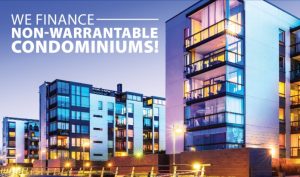Florida mortgage refinance or purchase loan for a non-warrantable condominium in Florida can be challenging, as these Florida condos don’t meet the specifications set by Fannie Mae and Freddie Mac. This makes them riskier for Florida non-warrantable condo lenders, so these mortgage loans typically come with higher interest rates and stricter requirements. However, several nontraditional Florida condo mortgage lenders still provide loans for nonwarrantable condos in Florida.

Non-Warrantable Florida Mortgage Options:
- 10% Down Limited Review + Piggyback Second Loan
- 10% – 20% Down Non-warrantable NON QM mortgage lenders.
- 25% Down Limited Review – Condos qualify for a minimum down payment of 25%
- 35-50% Down Florida Private Mortgage Lenders
All options are subject to the lender’s final approval.
It is always a good idea to get the condo questionnaire and budget first before we order the appraisal to make sure the condo meets the requirements.
Check Our Florida Approved Condos List:
CLICK HERE To Check Our Florida Limited and Non-Warrantable Condo List
Our Approved Florida Condo List may not guarantee full approval for your loan, but the accessibility to information from previously approved projects provides for a smoother, faster review.. To give yourself an edge with prospective condo approvals. The Approved Condo List can be used to check for approved condo projects in your area, further allowing you to save time and cost!
Non-warrantable vs. Warrantable Florida condominiums
Simply put, a non-warrantable condominium is one that does not meet the Fannie Mae OR Freedie Mac eligibility requirements for delivery making them eligible for purchase and securitization. Warrantable condos on the other hand meet the lending criteria established by the GSEs and have more Florida condo mortgage options available than non-warrantable condos.
Why a Florida condo might be non-warrantable:
-
Structural Issues: A leading reason Florida condo complexes fail to meet the requirements for more traditional financing is property repairs noted in the meeting minutes, outlined in special assessments, or confirmed on the HOA Questionnaire. Even if the issue does not directly impact the condo subject unit, it can still be a problem for financing.
-
HOA Delinquencies: No more than 15% of the units can be more than 60 days delinquent with HOA dues or special assessments. This is rarely an issue these days, but it often surfaces during real estate downturns.
-
Litigation: Litigation involving the HOA is usually a deal-killer, but not always if it is minor or doesn’t affect the subject unit. We need to review the actual litigation/complaint. We can also use a non-Fannie or non-QM lender, but the interest rate and down payment requirement will both be higher.
- A high percentage of non-owner-occupied units: If a large number of units in the building are rented out rather than occupied by owners, it can raise concerns about the stability and management of the condo association.
- Short-term rentals allowed: Buildings that allow a high volume of short-term rentals (like Airbnb) can be seen as less stable and potentially disruptive, making them less desirable for lenders.
-
Commercial Use: No more than 35% of the square footage of the entire complex can be “commercial.” Prior to 2018, the limit was 25%.
- Single entity ownership: If one person or company owns more than 50% of the units, it can give them undue influence over the condo association and raise concerns about potential conflicts of interest.
-
Concentration Rule: No single entity/person can own over 20% of the units in the complex.
- New construction or incomplete projects: Condos in new or unfinished buildings can be riskier due to potential construction issues or financial instability of the developer.
- Pending litigation: If the condo association is involved in ongoing lawsuits, it can create uncertainty and potential financial risks for lenders.
- Insufficient insurance or reserves: Lenders want to see that the condo association has adequate insurance coverage and sufficient reserves to handle unexpected repairs or expenses.
- Developer control: If the developer still controls the condo association, it can raise concerns about potential conflicts of interest and financial mismanagement.
Because of these factors, non-warrantable condos are considered riskier investments For Florida mortgage lenders so they typically charge higher interest rates and require larger down payments.
Florida Condo Ineligible Characteristics links:
- Check Freddie Mac’s list of Ineligible Florida Condo Projects here.
- Check Fannie Mae’s list of Ineligible Florida Condo Projects here.



